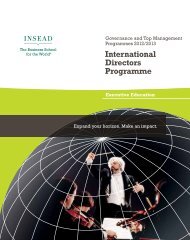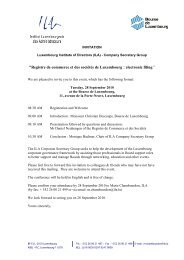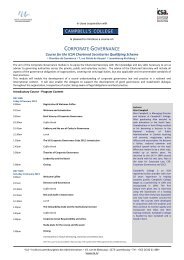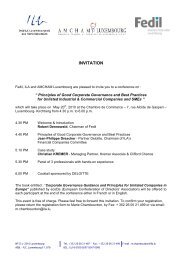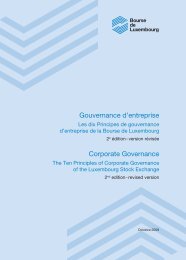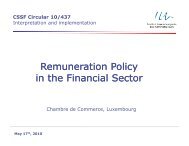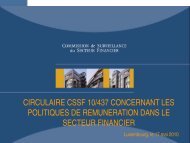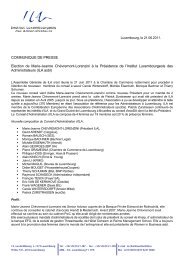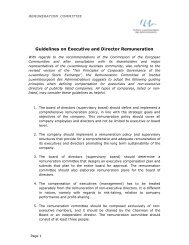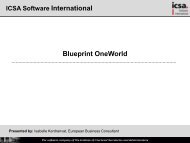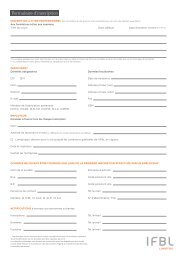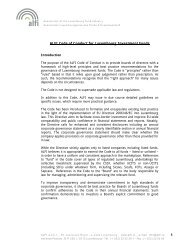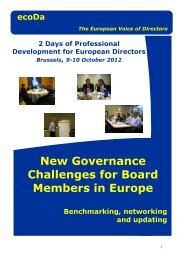26 January 2012 7th ILA and PwC Annual Fund Conference
26 January 2012 7th ILA and PwC Annual Fund Conference
26 January 2012 7th ILA and PwC Annual Fund Conference
You also want an ePaper? Increase the reach of your titles
YUMPU automatically turns print PDFs into web optimized ePapers that Google loves.
<strong>7th</strong> <strong>ILA</strong> <strong>and</strong> <strong>PwC</strong> <strong>Annual</strong> <strong>Fund</strong><br />
<strong>Conference</strong><br />
<strong>26</strong> <strong>January</strong> <strong>2012</strong>
John Parkhouse,<br />
Chair of the <strong>ILA</strong> fund committee <strong>and</strong> Partner, <strong>PwC</strong> Luxembourg
Agenda<br />
8.45 - 9.00 Introduction<br />
9.00 - 9.35 Regulation <strong>and</strong> what Boards should be focused on<br />
9. 35 - 10.05 International Developments in Regulation <strong>and</strong> Practice<br />
10.05 - 10.30 Audit green paper<br />
10.30 - 11.00 Coffee break<br />
11.00 - 11.45 Board evolution - the <strong>ILA</strong> FAQ <strong>and</strong> its practical application in the<br />
face of current topical issues<br />
11.45 - 12.15 Board Oversight of Risk Management<br />
12.15 - 13.30 Lunch<br />
13.30 - 13.45 <strong>ILA</strong> Update<br />
13.45 - 14.15 <strong>Fund</strong> Governance Survey Results<br />
14.15 - 15.30 Panel : The future of fund governance in Luxemburg <strong>and</strong> the EU<br />
15.30 - 16.00 Coffee break<br />
16.00 - 17.15 Open Forum on current developments & hot issues<br />
17.15 - 17.30 Conclusions<br />
As from 17.30<br />
Cocktail
<strong>ILA</strong> introduction<br />
John Parkhouse,<br />
Chair of the <strong>ILA</strong> fund committee <strong>and</strong> Partner, <strong>PwC</strong> Luxembourg
Objectives of the group<br />
• Lead development of the governance framework at board level for all<br />
regulated Luxembourg funds;<br />
• Provide technical <strong>and</strong> market support for directors of Luxembourg<br />
funds;<br />
• Liaise with respective stakeholders as needed (ALFI, CSSF etc) on<br />
behalf of the Luxembourg fund directors community;<br />
• Implement <strong>ILA</strong> level initiatives within the fund environment as<br />
relevant;<br />
• Ensure close interactions with ALFI initiatives.
Looking back… <strong>and</strong> looking forward<br />
FAQ<br />
ALFI<br />
Events<br />
Survey<br />
CO Forums<br />
• Events<br />
• Liability letters <strong>and</strong> risk for<br />
directors<br />
• Board Evaluation<br />
• AIFMD <strong>and</strong> its impact on<br />
Boards/Governance<br />
• Open Forum<br />
• FAQ<br />
• CSSF regime for<br />
Dirigeants <strong>and</strong> Directors<br />
• Survey
<strong>ILA</strong> Investment <strong>Fund</strong> Committee<br />
• Formed Q1 2008<br />
• Members:<br />
- John Parkhouse Chair, <strong>PwC</strong><br />
- Alan Crutchett Independent Director<br />
- Richard Goddard Independent Director<br />
- Graham Goodhew Dirigeant JPMorgan Asset Management Europe<br />
- Henry Kelly Independent Director, KellyConsult, Chair of ALFI <strong>Fund</strong> Governance WG<br />
- Bill Lockwood Conducting Officer Franklin Templeton Investments<br />
- Jan Jaap Hazenberg Head of Product Strategy & Market Intelligence, ING Investment<br />
Management Europe<br />
- Jérôme Wigny Elvinger, Hoss & Prussen<br />
- Paul Guillaume Independent Director<br />
- Martin Vogel CEO<br />
- Monique Bachner Bachner Legal
www.ila.lu
Regulation<br />
<strong>and</strong> what Boards should be focused on<br />
Michèle Eisenhuth,<br />
Arendt & Medernach
Regulation <strong>and</strong> what Boards<br />
should be focused on<br />
Michèle Eisenhuth, Partner, Arendt & Medernach<br />
<strong>26</strong> <strong>January</strong> <strong>2012</strong>
Table of contents<br />
I. Focus on the Key Investor Information Document (KIID)<br />
II. UCITS IV conflicts of interest <strong>and</strong> best execution requirements: the<br />
role of the board of the fund<br />
III. Outline on specific AML issues under the amended 2004 Law<br />
11
I. Focus on the Key Investor Information Document (KIID)<br />
• Focus on the responsibility related to the content of the KIID<br />
• Focus on the delivery of the KIID to investors:<br />
‣ assessment of the entity responsible for delivering the KIID<br />
‣ delivering the KIID in good time to investors<br />
12
Focus on the responsibility related to the content of the<br />
KIID<br />
Rule:<br />
The self-managed UCITS or the management company is responsible to<br />
ensure that the KIID is not misleading, that it is accurate, consistent with the<br />
prospectus <strong>and</strong> up-to-date.<br />
Consequence:<br />
As the KIID contains financial information (SRRI, ongoing charges <strong>and</strong><br />
performances), the UCITS or the management company must put in place<br />
internal or outsourced appropriate mechanisms <strong>and</strong> systems to be able to<br />
issue the KIID in due time <strong>and</strong> assess on an ongoing basis the content of the<br />
KIID so as to keep it accurate <strong>and</strong> up-to-date.<br />
13
Focus on the responsibility related to the content of the<br />
KIID (ctd.)<br />
Questions:<br />
1) May a benchmark be inserted in the KIID without being<br />
mentioned in the UCITS prospectus?<br />
2) Does the disclosure on the “ongoing charges” need to be<br />
reviewed continually or only on the occurrence of a material<br />
event?<br />
14
Focus on the delivery of the KIID to investors<br />
• Assessment of the entity responsible for delivering the KIID:<br />
Rule:<br />
A self-managed UCITS or the management company is responsible for:<br />
‣ providing investors with the KIID when selling units directly or through<br />
intermediaries acting under the UCITS <strong>and</strong>/or its management company’s<br />
behalf <strong>and</strong> under its full <strong>and</strong> unconditional responsibility; or<br />
‣ providing product manufacturers <strong>and</strong> intermediaries with the KIID upon<br />
request (the latter being responsible for delivering the KIID to investors),<br />
when not selling units directly or through intermediaries acting under the<br />
UCITS <strong>and</strong>/or its management company’s behalf <strong>and</strong> under its full <strong>and</strong><br />
unconditional responsibility.<br />
15
Focus on the delivery of the KIID to investors (ctd.)<br />
• Assessment of the entity responsible for delivering the KIID (ctd.):<br />
Consequence:<br />
The self-managed UCITS or the management company should assess which<br />
entity is responsible for delivering the KIID to investors <strong>and</strong> review the<br />
agreements with its distributors as the case may be.<br />
16
Focus on the delivery of the KIID to investors (ctd.)<br />
• Assessment of the entity responsible for delivering the KIID (ctd.):<br />
Questions:<br />
1) Is the UCITS’ registrar <strong>and</strong> transfer agent responsible for delivering the<br />
KIID when directly contacted by an investor?<br />
2) Is a website platform responsible for delivering the KIID when an investor<br />
is subscribing through it?<br />
17
Focus on the delivery of the KIID to investors (ctd.)<br />
• Responsibility for delivering the KIID in good time to investors :<br />
Rule:<br />
The KIID constitutes pre-contractual information that shall be delivered to<br />
investors free of charge in good time before subscription of units in the<br />
UCITS is proposed.<br />
Consequence:<br />
Distributors should be educated to deliver the KIID prior to any investment<br />
<strong>and</strong> to evidence the delivery of the KIID to investors.<br />
18
Focus on the delivery of the KIID to investors (ctd.)<br />
• Responsibility for delivering the KIID in good time to investors (ctd.) :<br />
Questions:<br />
1) Do existing investors need to receive the KIID?<br />
2) Do existing investors need to receive the KIID for subsequent<br />
subscriptions?<br />
19
II.<br />
UCITS IV conflicts of interest <strong>and</strong> best execution<br />
requirements: the role of the board of the fund<br />
• The UCITS IV Directive imposes a number of<br />
requirements in terms of conflicts of interest<br />
<strong>and</strong> best execution on UCITS management<br />
companies or directly on self-managed UCITS<br />
<strong>Fund</strong> Board<br />
of Directors<br />
• The duty to comply with such obligations<br />
remains unaffected by the delegation of certain<br />
fonctions to third party service providers (e.g.<br />
investment manager)<br />
Management<br />
Company<br />
• It is the duty of the board of the fund, in light of<br />
its ultimate responsibility for the management of<br />
the fund, to verify that all necessary steps are<br />
taken at each level to comply with these UCITS<br />
IV requirements<br />
Service<br />
Provider<br />
20
Conflicts of interest: UCITS IV requirements<br />
• A written conflicts of interest policy must be established to (i) identify<br />
potential/existing conflicts of interest entailing a material risk of damage to<br />
the fund <strong>and</strong> (ii) set up procedures <strong>and</strong> measures to manage these in an<br />
independent manner<br />
• Conflicting situations <strong>and</strong> corresponding procedures/measures must be<br />
recorded in a regularly updated register<br />
• Unresolved conflicts must be escalated to senior management which<br />
must take action in the best interest of the fund (to be reported to<br />
investors, e.g. in the annual report)<br />
21
Conflicts of interest: other legal provisions applicable to<br />
individual board members<br />
• Luxembourg Company Law (Article 57)<br />
Applicable to all Luxembourg funds established in corporate form;<br />
Any director having a conflict of interest is obliged to advise the board <strong>and</strong> may<br />
not take part in the deliberation;<br />
Proposed amendment pending (Proposal 5703). In particular, any decision<br />
taken by the Board without respecting Article 57 could become null <strong>and</strong> void.<br />
• ALFI Code of Conduct (Section 8)<br />
Luxembourg funds are strongly advised to adopt a code of conduct. Listed<br />
funds must indicate in their annual report which code of conduct they have<br />
adopted or explain why no code has been adopted;<br />
Under the ALFI code the board should: (i) identify conflicts of interest of its<br />
members, (ii) define the means to avoid, manage or disclose such conflicts, (iii)<br />
maintain sufficient autonomy to resolve conflicts of interests impartially.<br />
• EFAMA Code of Conduct: High level principles <strong>and</strong> best practice recommendations<br />
22
Best execution principle<br />
• The management company or the self-managed UCITS must establish<br />
procedures, arrangements <strong>and</strong> policies ensuring that the best possible<br />
result is achieved when executing orders for the fund<br />
• The management company or the self-managed UCITS must be able to<br />
demonstrate that orders have been executed/placed on behalf of the fund<br />
in accordance with the best execution policy (adequate reporting of<br />
transactions)<br />
• The board of the fund must give its prior consent on the best execution<br />
policy, which must be reviewed on an annual basis or when a relevant<br />
material change occurs<br />
• Appropriate information on the policy <strong>and</strong> any material change thereto<br />
must be made available to investors (e.g. published on the fund’s website<br />
or provided on request)<br />
23
Situations requiring the attention of the board in terms of<br />
conflicts of interest <strong>and</strong> best execution (examples)<br />
Situations<br />
• Board members may be directors,<br />
officers or employees of the promoter<br />
of the fund or the investment manager<br />
• The investment manager may advise<br />
or manage assets for other clients or<br />
engage in proprietary trading<br />
Potential Conflicts<br />
• In such capacity, the interests of board<br />
members may diverge from their fiduciary<br />
duties towards the fund<br />
• Conflicts may arise with respect to the time<br />
<strong>and</strong> resources that such board members may<br />
devote to the fund<br />
• The investment manager may face conflicts<br />
when allocating investment opportunities<br />
between the fund, other clients <strong>and</strong> its own<br />
trading activity<br />
• The other activities of the investment<br />
manager may adversely impact the markets<br />
in which the fund is invested <strong>and</strong> vice versa<br />
24
Situations requiring the attention of the board in terms of<br />
conflicts of interest <strong>and</strong> best execution (examples/ctd.)<br />
Situations<br />
•Certain assets of the fund may be<br />
valued by the investment manager<br />
Potential conflicts<br />
•The investment manager may face a<br />
conflict when valuing assets of the fund as<br />
the fund’s NAV generally affects the<br />
investment manager’s fees<br />
•The promoter, the investment manager<br />
or an entity of the same group may deal<br />
commercially with the fund, including as<br />
counterparty to OTC derivatives<br />
• The fund may not deal at the best<br />
available terms <strong>and</strong> conditions, especially<br />
for very specific trades with no or limited<br />
reference market (e.g. swaps on<br />
homemade strategy indices)<br />
25
Situations requiring the attention of the board in terms of<br />
conflicts of interest <strong>and</strong> best execution (examples/ctd.)<br />
Situations<br />
• The investment manager may be the<br />
sponsor <strong>and</strong>/or calculation agent of an<br />
index replicated by the fund (<strong>and</strong> by<br />
other funds or products promoted by the<br />
investment manager or an affiliated<br />
entity) <strong>and</strong>/or swap counterparty<br />
• The investment manager may also<br />
trade in the assets underlying the index<br />
for other clients or for its own account<br />
Potential conflicts<br />
• The investment manager may face<br />
conflicts between these different roles <strong>and</strong><br />
its own interest, especially to the extent the<br />
index sponsor <strong>and</strong>/or calculation agent have<br />
the ability to make certain decisions to<br />
administer the index<br />
• Trading in the underlying assets may<br />
adversely impact the performance of the<br />
index <strong>and</strong> therefore of the fund<br />
<strong>26</strong>
III.<br />
Outline on specific AML issues under the amended<br />
2004 Law<br />
History<br />
• 2004 Law: automatic exemption in certain circumstances<br />
• ALFI/ABBL/ALCO Practices <strong>and</strong> Recomm<strong>and</strong>ations on AML dated<br />
December 2006<br />
‣ Guidance on best practices for the Luxembourg fund industry<br />
‣ to be updated<br />
• 2008: amendment of the 2004 Law<br />
• GDR dated 29 July 2008: list of “equivalent” third countries<br />
• CSSF Circular 08/387: exp<strong>and</strong>s on certain provisions of the 2004 Law<br />
27
Outline on specific AML issues under the amended 2004<br />
Law (ctd.)<br />
History (ctd.)<br />
• GDR dated 1 December 2009: list of “equivalent” third countries abolished<br />
• GDR dated 1 February 2010<br />
• CSSF Circular 10/476: abrogation of the “group” concept<br />
• Law dated 27 October 2010: repeal of automatic exemption from CDD,<br />
concept of “other similar relationships”<br />
• CSSF Circular 10/495<br />
28
Outline on specific AML issues under the amended 2004<br />
Law (ctd.)<br />
Rationae personae of the amended 2004 Law<br />
• Out of scope: funds not marketing their units or shares themselves<br />
• In scope: funds marketing their units or shares themselves<br />
• Simplified CDD (Article 3-1)<br />
• Enhanced CDD (Article 3-3(1) to (4))<br />
• Delegation to a third party (Article 3-3(1)-(4))<br />
• Outsourcing to “trusted persons” (Article 3-3(5))<br />
29
Outline on specific AML issues under the amended 2004<br />
Law (ctd.)<br />
Practical aspects of fund boards’ role under the amended 2004<br />
Law<br />
Revised simplified CDD (Article 3-1)<br />
• Repeal of automatic exemption<br />
• If clients = institutions subject to equivalent CDD rules<br />
‣ Equivalence : risk self-assessment<br />
‣ Ongoing monitoring<br />
• Identification <strong>and</strong> verification of the client<br />
‣ “reasonable amount of information”<br />
‣ BO ?<br />
30
Outline on specific AML issues under the amended 2004<br />
Law (ctd.)<br />
Practical aspects of fund boards’ role under the amended 2004<br />
Law (ctd.)<br />
Enhanced CDD: correspondent banking relationships with<br />
credit/financial institutions in third countries <strong>and</strong> other similar<br />
relationships as an alternative to simplified CDD (Article 3-2(3))<br />
• Enhanced CDD on the respondent institution only ?<br />
• <strong>Fund</strong> board’s enhanced obligations<br />
• « other similar relationships »<br />
‣ Relationship between a fund <strong>and</strong> a nominee ?<br />
31
Outline on specific AML issues under the amended 2004<br />
Law (ctd.)<br />
Practical aspects of fund boards’ role under the amended 2004<br />
Law (ctd.)<br />
Performance of the CDD by third parties (Article 3-3(1) to (4))<br />
• For institutions subject to equivalent CDD rules<br />
• Liability remains with the fund<br />
• Transfer of data without objecting any confidentiality or professional secrecy<br />
rules<br />
32
Outline on specific AML issues under the amended 2004<br />
Law (ctd.)<br />
Practical aspects of fund boards’ role under the amended 2004<br />
Law (ctd.)<br />
Outsourcing to “trusted persons” not subject to the 2004 Law or<br />
equivalent regulations (Article 3-3(5))<br />
• Application of Luxembourg AML regulations<br />
• Liability: CDD performed by the service provider/agent deemed performed<br />
by the fund<br />
33
Contact us<br />
• Michèle Eisenhuth<br />
• Partner at Arendt & Medernach<br />
• Tel : +352 40 78 78 638<br />
• Email : michele.eisenhuth@arendt.com
International Developments in Regulation <strong>and</strong><br />
Practice<br />
Alain Guérard,<br />
ManagementPlus Luxembourg<br />
Henry Kelly,<br />
KellyConsult S.à r.l.
Henry Kelly, Independent Director, KellyConsult Sàrl<br />
Alain Guérard, Managing Director, ManagementPlus (Luxembourg) S.A.<br />
<br />
<strong>ILA</strong> <strong>and</strong> <strong>PwC</strong> <strong>Annual</strong> <strong>Fund</strong> <strong>Conference</strong>: <strong>26</strong> <strong>January</strong> <strong>2012</strong>
<strong>ILA</strong> <strong>and</strong> <strong>PwC</strong> <strong>Annual</strong> <strong>Fund</strong> <strong>Conference</strong>: <strong>26</strong> <strong>January</strong> <strong>2012</strong><br />
<br />
<br />
<br />
<br />
<br />
Increased focus on the role <strong>and</strong> responsibilities of fund directors (industry<br />
codes, EU Green Paper, etc.)<br />
<strong>Fund</strong> governance vs. corporate governance<br />
Inter-action with other actors within fund governance arena<br />
(depositary, investment manager, auditor, etc.)<br />
Self regulation (e.g. Codes) vs. imposed regulation<br />
Irish, UK <strong>and</strong> European developments<br />
37
Issued in December 2011, effective 1 <strong>January</strong> <strong>2012</strong><br />
<strong>ILA</strong> <strong>and</strong> <strong>PwC</strong> <strong>Annual</strong> <strong>Fund</strong> <strong>Conference</strong>: <strong>26</strong> <strong>January</strong> <strong>2012</strong><br />
“Voluntary” with full application from <strong>January</strong> 2013<br />
<br />
<br />
Applicable to CIS <strong>and</strong> Management Companies<br />
Reasons for non-compliance with any provisions of the Code to be<br />
disclosed in a “publicly available medium” (e.g. Directors’ Report,<br />
annual report on website)<br />
38
Minimum of 3 directors<br />
<strong>ILA</strong> <strong>and</strong> <strong>PwC</strong> <strong>Annual</strong> <strong>Fund</strong> <strong>Conference</strong>: <strong>26</strong> <strong>January</strong> <strong>2012</strong><br />
<br />
<br />
<br />
Majority of non-executive directors<br />
At least one independent director<br />
(independence: neither employee/partner of CIS/ManCo nor of service<br />
provider nor significant shareholder)<br />
Minimum of 2 directors must be Irish resident<br />
39
<strong>ILA</strong> <strong>and</strong> <strong>PwC</strong> <strong>Annual</strong> <strong>Fund</strong> <strong>Conference</strong>: <strong>26</strong> <strong>January</strong> <strong>2012</strong><br />
<br />
<br />
<br />
<br />
<br />
Minimum of two directors available to meet the Central Bank at short<br />
notice (one must be an independent non-executive director)<br />
Letter of appointment specifying time commitment<br />
Directors to disclose time commitments (incl. foreign CIS)<br />
Maximum of 8 non-fund directorships<br />
Disclosure of conflicts of interest<br />
40
Board membership to be formally reviewed every 3 years<br />
<strong>ILA</strong> <strong>and</strong> <strong>PwC</strong> <strong>Annual</strong> <strong>Fund</strong> <strong>Conference</strong>: <strong>26</strong> <strong>January</strong> <strong>2012</strong><br />
<br />
<br />
<br />
<br />
<strong>Annual</strong> Board evaluation with formal review every 3 years<br />
Role of Board (strategy, appointment <strong>and</strong> oversight of service providers,<br />
compliance, risk management, etc.)<br />
Meetings (at least quarterly, full documentation)<br />
Definition of reserved powers <strong>and</strong> use of committees<br />
41
Financial Reporting Council (FRC): UK CG regulator<br />
<strong>ILA</strong> <strong>and</strong> <strong>PwC</strong> <strong>Annual</strong> <strong>Fund</strong> <strong>Conference</strong>: <strong>26</strong> <strong>January</strong> <strong>2012</strong><br />
<br />
First UK Code on Corporate Governance produced in 1992 by the<br />
Cadbury Committee<br />
The UK Corporate Governance Code (June 2010)<br />
o<br />
o<br />
o<br />
“Comply or explain”<br />
Applies to listed companies<br />
Five main principles: leadership, effectiveness, accountability,<br />
remuneration, shareholder relations<br />
42
The UK Stewardship Code (July 2010)<br />
<strong>ILA</strong> <strong>and</strong> <strong>PwC</strong> <strong>Annual</strong> <strong>Fund</strong> <strong>Conference</strong>: <strong>26</strong> <strong>January</strong> <strong>2012</strong><br />
o<br />
o<br />
o<br />
o<br />
o<br />
Complements UK Corporate Governance Code<br />
“Comply or explain”<br />
Applicable to UK-authorised asset managers<br />
Objective: enhance quality of engagement between institutional investors <strong>and</strong><br />
investee companies<br />
Seven principles covering proxy voting, conflict of interests policy, monitoring investee<br />
companies<br />
FRC Guidance on Board Effectiveness (March 2011)<br />
Association of Investment Companies Code (May 2007)<br />
43
EFAMA Code for External Governance (April 2011)<br />
<strong>ILA</strong> <strong>and</strong> <strong>PwC</strong> <strong>Annual</strong> <strong>Fund</strong> <strong>Conference</strong>: <strong>26</strong> <strong>January</strong> <strong>2012</strong><br />
<br />
o<br />
o<br />
Voting policy <strong>and</strong> disclosure<br />
Monitoring of investee companies<br />
EU Green Paper on Corporate Governance in financial institutions <strong>and</strong><br />
remuneration policies (June 2010)<br />
o<br />
o<br />
o<br />
o<br />
Risk management; conflict of interests<br />
Board: number of m<strong>and</strong>ates, remuneration<br />
External governance<br />
External auditors; Supervisory authorities<br />
44
<strong>ILA</strong> <strong>and</strong> <strong>PwC</strong> <strong>Annual</strong> <strong>Fund</strong> <strong>Conference</strong>: <strong>26</strong> <strong>January</strong> <strong>2012</strong><br />
<br />
<br />
Board Composition<br />
o<br />
o<br />
o<br />
o<br />
o<br />
Role of independent directors<br />
Importance of the role of the chairman<br />
Board membership review <strong>and</strong> evaluations<br />
Directors’ competence, experience <strong>and</strong> training<br />
Stricter screening of directors by regulators<br />
Board Focus<br />
o<br />
o<br />
o<br />
Conflicts of interest<br />
Risk management <strong>and</strong> internal controls<br />
Regulatory <strong>and</strong> compliance issues<br />
45
Independent Directors Council (IDC) & Investment Company Institute (ICI)<br />
<strong>Fund</strong> Governance Practices Report 1994-2010 – Released Oct 2011<br />
<strong>ILA</strong> <strong>and</strong> <strong>PwC</strong> <strong>Annual</strong> <strong>Fund</strong> <strong>Conference</strong>: <strong>26</strong> <strong>January</strong> <strong>2012</strong><br />
Universe: $12 Trillion AUM for 7,756 funds in 2010<br />
<br />
<strong>Fund</strong> Governance Development:<br />
46
<strong>ILA</strong> <strong>and</strong> <strong>PwC</strong> <strong>Annual</strong> <strong>Fund</strong> <strong>Conference</strong>: <strong>26</strong> <strong>January</strong> <strong>2012</strong><br />
Source: ICI & IDC <strong>Fund</strong> Governance <strong>Fund</strong> Practices 1994-2010<br />
47
<strong>ILA</strong> <strong>and</strong> <strong>PwC</strong> <strong>Annual</strong> <strong>Fund</strong> <strong>Conference</strong>: <strong>26</strong> <strong>January</strong> <strong>2012</strong><br />
Source: ICI & IDC <strong>Fund</strong> Governance <strong>Fund</strong> Practices 1994-2010<br />
48
<strong>ILA</strong> <strong>and</strong> <strong>PwC</strong> <strong>Annual</strong> <strong>Fund</strong> <strong>Conference</strong>: <strong>26</strong> <strong>January</strong> <strong>2012</strong><br />
Source: ICI & IDC <strong>Fund</strong> Governance <strong>Fund</strong> Practices 1994-2010<br />
49
<strong>ILA</strong> <strong>and</strong> <strong>PwC</strong> <strong>Annual</strong> <strong>Fund</strong> <strong>Conference</strong>: <strong>26</strong> <strong>January</strong> <strong>2012</strong><br />
Source: ICI & IDC <strong>Fund</strong> Governance <strong>Fund</strong> Practices 1994-2010<br />
50
<strong>ILA</strong> <strong>and</strong> <strong>PwC</strong> <strong>Annual</strong> <strong>Fund</strong> <strong>Conference</strong>: <strong>26</strong> <strong>January</strong> <strong>2012</strong><br />
Source: ICI & IDC <strong>Fund</strong> Governance <strong>Fund</strong> Practices 1994-2010<br />
51
<strong>ILA</strong> <strong>and</strong> <strong>PwC</strong> <strong>Annual</strong> <strong>Fund</strong> <strong>Conference</strong>: <strong>26</strong> <strong>January</strong> <strong>2012</strong><br />
90%<br />
80%<br />
70%<br />
60%<br />
50%<br />
40%<br />
30%<br />
20%<br />
10%<br />
0%<br />
Proportion of boards with at least one<br />
independent director<br />
85%<br />
81%<br />
75%<br />
67%<br />
UCITS NON-UCITS Anglo-Saxon Continental<br />
Source: <strong>PwC</strong>-<strong>ILA</strong> <strong>Fund</strong> Governance Survey 2010/2011<br />
52
<strong>ILA</strong> <strong>and</strong> <strong>PwC</strong> <strong>Annual</strong> <strong>Fund</strong> <strong>Conference</strong>: <strong>26</strong> <strong>January</strong> <strong>2012</strong><br />
80%<br />
70%<br />
60%<br />
50%<br />
40%<br />
30%<br />
20%<br />
10%<br />
0%<br />
Proportion of UCITS boards with at least one<br />
independent director<br />
55%<br />
62%<br />
75%<br />
2006 2008 2010<br />
Source: <strong>PwC</strong>-<strong>ILA</strong> <strong>Fund</strong> Governance Survey 2010/2011<br />
53
<strong>ILA</strong> <strong>and</strong> <strong>PwC</strong> <strong>Annual</strong> <strong>Fund</strong> <strong>Conference</strong>: <strong>26</strong> <strong>January</strong> <strong>2012</strong><br />
Source: ICI & IDC <strong>Fund</strong> Governance <strong>Fund</strong> Practices 1994-2010<br />
54
<strong>ILA</strong> <strong>and</strong> <strong>PwC</strong> <strong>Annual</strong> <strong>Fund</strong> <strong>Conference</strong>: <strong>26</strong> <strong>January</strong> <strong>2012</strong><br />
Source: ICI & IDC <strong>Fund</strong> Governance <strong>Fund</strong> Practices 1994-2010<br />
55
<strong>ILA</strong> <strong>and</strong> <strong>PwC</strong> <strong>Annual</strong> <strong>Fund</strong> <strong>Conference</strong>: <strong>26</strong> <strong>January</strong> <strong>2012</strong><br />
Source: ICI & IDC <strong>Fund</strong> Governance <strong>Fund</strong> Practices 1994-2010<br />
56
<strong>ILA</strong> <strong>and</strong> <strong>PwC</strong> <strong>Annual</strong> <strong>Fund</strong> <strong>Conference</strong>: <strong>26</strong> <strong>January</strong> <strong>2012</strong><br />
Source: ICI & IDC <strong>Fund</strong> Governance <strong>Fund</strong> Practices 1994-2010<br />
57
<strong>ILA</strong> <strong>and</strong> <strong>PwC</strong> <strong>Annual</strong> <strong>Fund</strong> <strong>Conference</strong>: <strong>26</strong> <strong>January</strong> <strong>2012</strong><br />
Source: ICI & IDC <strong>Fund</strong> Governance <strong>Fund</strong> Practices 1994-2010<br />
58
<strong>ILA</strong> <strong>and</strong> <strong>PwC</strong> <strong>Annual</strong> <strong>Fund</strong> <strong>Conference</strong>: <strong>26</strong> <strong>January</strong> <strong>2012</strong><br />
Source: ICI & IDC <strong>Fund</strong> Governance <strong>Fund</strong> Practices 1994-2010<br />
59
<strong>ILA</strong> <strong>and</strong> <strong>PwC</strong> <strong>Annual</strong> <strong>Fund</strong> <strong>Conference</strong>: <strong>26</strong> <strong>January</strong> <strong>2012</strong><br />
Source: ICI & IDC <strong>Fund</strong> Governance <strong>Fund</strong> Practices 1994-2010<br />
60
<strong>ILA</strong> <strong>and</strong> <strong>PwC</strong> <strong>Annual</strong> <strong>Fund</strong> <strong>Conference</strong>: <strong>26</strong> <strong>January</strong> <strong>2012</strong><br />
<br />
<br />
<br />
<br />
<br />
<br />
<br />
<br />
<br />
<br />
<strong>Fund</strong> Boards, as a group, follow strong governance practices to best serve the interest of the<br />
shareholders - Study of board practices indicate that over the past 16 years, fund boards have adopted<br />
such practices in advance or in absence of any regulatory m<strong>and</strong>ate to do so.<br />
91% of fund surveyed have more than 75% independent directors on their boards<br />
63% of surveyed funds have an independent board chair<br />
39% of surveyed funds have more than 4 board meetings per year<br />
29% of surveyed funds requires independent directors to own shares in the fund<br />
Average Independent Director Age is 65 years old<br />
Average Independent Direct Length of Service is 11 years<br />
91% of <strong>Fund</strong>s surveyed report to have a dedicated legal counsel for its independent directors<br />
97% of Surveyed funds report having a financial expert on the audit committee (disclosure is required<br />
by SEC)<br />
http://www.ici.org/pressroom/news/11_news_fund_gov_pract<br />
61
<strong>ILA</strong> <strong>and</strong> <strong>PwC</strong> <strong>Annual</strong> <strong>Fund</strong> <strong>Conference</strong>: <strong>26</strong> <strong>January</strong> <strong>2012</strong><br />
Thank you<br />
62
Audit Green Paper<br />
Pierre Krier,<br />
Chair of IRE, <strong>PwC</strong> Luxembourg
<strong>ILA</strong> <strong>and</strong> <strong>PwC</strong> <strong>Annual</strong> <strong>Conference</strong><br />
<strong>26</strong> <strong>January</strong> <strong>2012</strong><br />
EC Legislative Proposals on Audit Policy<br />
Pierre Krier<br />
President<br />
Institut des Réviseurs d’Entreprises
Why EC Proposals on Audit Policy?<br />
• Financial <strong>and</strong> economic crisis (Eurozone debt crisis, liquidity/solvency constraints for<br />
banks, credit crunch, low GDP growth);<br />
• EC Internal Markets Reform Agenda:<br />
- European Supervisory Authorities (ESMA, EBA, EIOPA);<br />
- Banking Regulations;<br />
- Financial Instruments;<br />
- Rating Agencies.<br />
• Time to further regulate Audit Profession;<br />
• Michel Barnier, EC Commissionner Internal Markets: “Status quo is not an option”.<br />
<strong>26</strong> <strong>January</strong> <strong>2012</strong>
Evolution of Audit Profession Regulations<br />
since 2000<br />
• 2001 Collapse Enron, Demise Arthur Andersen;<br />
• 2002 Sarbanes Oxley Act <strong>and</strong> creation of PCAOB;<br />
• 2002 EC Recommendation on statutory auditors independence;<br />
• 2006 EU Audit Directive (8 th Directive):<br />
- End of Self Regulation;<br />
- Start of Public Supervision;<br />
- Public adoption of Auditing St<strong>and</strong>ards.<br />
• 2009 Public adoption of “clarified” ISA.<br />
Objective: Strengthening of Audit Quality<br />
<strong>26</strong> <strong>January</strong> <strong>2012</strong>
Next steps: Proposal for a Directive <strong>and</strong> a<br />
Regulation published by the EC on<br />
30 November 2011<br />
• Objective: Further strengthening of Audit Quality;<br />
• 4 focus areas:<br />
- Narrow audit expectation gap;<br />
- Reinforcement of auditor independence;<br />
- Opening-up of audit market to new entrants;<br />
- Creation of an integrated European audit market.<br />
• Shortfalls:<br />
- Disregard of 2010 Green Paper consultation results;<br />
- No impact assessment done of 2006 EU Audit Directive;<br />
- Disregard of September 2011 EP “Own initiative report” concerning Green Paper<br />
propositions.<br />
<strong>26</strong> <strong>January</strong> <strong>2012</strong>
Who will be impacted by the EC Proposals<br />
on Audit Policy?<br />
• Audit Profession: in particular statutory auditors of Public Interest Entities (PIE)<br />
• Auditees: in particular PIE being:<br />
- Listed companies;<br />
- Credit institutions;<br />
- Insurance undertakings;<br />
- Payments institutions;<br />
- E-money institutions;<br />
- Investment firms.<br />
- Central securities depositories;<br />
- EU Alternative investment funds;<br />
- UCITS.<br />
• Public Supervisory Authorities of Audit Profession:<br />
- EU: ESMA;<br />
- Lux: CSSF.<br />
<strong>26</strong> <strong>January</strong> <strong>2012</strong>
Positive Proposals<br />
Strengthening of corporate governance relating to<br />
statutory audit<br />
• Audit Committee requirement for each PIE (art. 31): composed of<br />
non-executive directors with industry specific competence. 2 members knowledgeable<br />
in accounting <strong>and</strong> audit. Majority of members <strong>and</strong> chairman to be independent<br />
AC exemption for UCITS or AIF: explain to the public the reasons for not having an AC<br />
• Appointment of statutory auditors (art. 32): formal selection process to be<br />
organised by AC. Comprehensive tender documents to be prepared. Invitation to at<br />
least 2 audit firms of which at least one which has less than 15% total audit fees from<br />
large PIE. AC to submit a recommendation regarding the audit firm to be selected to<br />
Board of Directors. Final appointment to be approved by the shareholders<br />
For banks <strong>and</strong> insurance companies: veto right by supervisory authorities of audit<br />
profession regarding proposed audit appointment<br />
<strong>26</strong> <strong>January</strong> <strong>2012</strong>
Positive Proposals<br />
Strengthening of corporate governance relating to<br />
statutory audit (cont.)<br />
• Communication of statutory audit results (art. 21-25):<br />
- To the public: extended audit report (4 pages max.) presenting the results of the<br />
statutory audit. In addition to true <strong>and</strong> fair view audit opinion, information on<br />
audit methodology, materiality levels, key risk areas including fraud;<br />
- To the AC: additional report explaining in detail results of the audit (process, work<br />
done, findings, control issues, compliance issues, going concern issues);<br />
AC can disclose report to Management, Board of Directors <strong>and</strong> shareholders:<br />
- To the Supervisors of the audited PIE: duty of statutory auditors to report<br />
promptly to the Supervisors any material breach of laws/regulations, going concern<br />
issues, refusal to issue audit opinion or qualified opinion.<br />
• Harmonisation of Auditing St<strong>and</strong>ards across the EU:<br />
- After the harmonisation of the accounting st<strong>and</strong>ards (IFRS) to be applied by<br />
corporates, now harmonisation of auditing st<strong>and</strong>ards (ISA) to be applied by<br />
auditors.<br />
<strong>26</strong> <strong>January</strong> <strong>2012</strong>
Negative Proposals<br />
Audit Profession in Europe believes the following<br />
proposals will weaken audit quality<br />
• M<strong>and</strong>atory Firm Rotation (art. 33): every 6 years. Every 9 years in case of Joint<br />
Audit. 4 year cooling-off period;<br />
- Investment for auditee <strong>and</strong> auditor because of familiarisation process after each<br />
new appointment;<br />
- Italy: only EU country with m<strong>and</strong>atory firm rotation. No new entrants to PIE audit<br />
market. Even higher concentration among large audit firms;<br />
- EC to do first impact assessment regarding internal rotation principle required by<br />
8th Directive.<br />
<strong>26</strong> <strong>January</strong> <strong>2012</strong>
Negative Proposals<br />
Audit Profession in Europe believes the following<br />
proposals will weaken audit quality (cont.)<br />
• Prohibition of the provision of non-audit services (art. 10):<br />
- PIE auditor restricted to statutory audit services <strong>and</strong> related financial<br />
audit services (limited to 10% of the statutory audit fees):<br />
◦ Scope of related financial audit services: review of interim accounts, corporate<br />
governance/CSR statements, regulatory reporting, compliance with tax<br />
requirements;<br />
◦ Issue in certain EU countries including Luxembourg, where additional work<br />
assigned to auditors by law: Long Form Report, NAV error or compliance<br />
breaches, periodic review of interim accounts, German tax certificates.<br />
- Total ban of non-audit services to PIE by their statutory auditors<br />
(including tax consultancy <strong>and</strong> advisory services).<br />
<strong>26</strong> <strong>January</strong> <strong>2012</strong>
Negative Proposals<br />
Audit Profession in Europe believes the following<br />
proposals will weaken audit quality (cont.)<br />
• Prohibition of the provision of non-audit services (art. 10) (cont.):<br />
- Creation of pure audit firms: audit firms generating more than 33% of their<br />
annual audit revenues from large PIE <strong>and</strong> belonging to a network having annual<br />
audit revenues exceeding €1,5 bio:<br />
◦ Shall not provide non-audit services to any PIE;<br />
◦ Shall not belong to a network that provides non-audit services within the EU;<br />
◦ Increasing complexity of the corporates requires non-audit experts to be<br />
involved in the audit process to ensure quality work (example tax consultants, IT<br />
experts, actuaries, risk management experts);<br />
◦ Loss of attractiveness of pure audit firms for experts, decrease of competencies<br />
in audit firms, lower audit quality;<br />
◦ Dem<strong>and</strong> of corporate world to have multi-disciplinary audit firms knowing their<br />
business <strong>and</strong> culture who can help them in areas other than audit;<br />
◦ AC to ensure avoidance of independence issues through approval of non-audit<br />
services.<br />
<strong>26</strong> <strong>January</strong> <strong>2012</strong>
Negative Proposals<br />
Audit Profession in Europe believes the following<br />
proposals will weaken audit quality (cont.)<br />
• Prohibition of the provision of non-audit services (art. 10) (cont.):<br />
- Creation of pure audit firms: audit firms generating more than 33% of their<br />
annual audit revenues from large PIE <strong>and</strong> belonging to a network having annual<br />
audit revenues exceeding €1,5 bio:<br />
◦ Shall not provide non-audit services to any PIE;<br />
◦ Shall not belong to a network that provides non-audit services within the EU;<br />
◦ Increasing complexity of the corporates requires non-audit experts to be<br />
involved in the audit process to ensure quality work (example tax consultants, IT<br />
experts, actuaries, risk management experts);<br />
◦ Loss of attractiveness of pure audit firms for experts, decrease of competencies<br />
in audit firms, lower audit quality;<br />
◦ Dem<strong>and</strong> of corporate world to have multi-disciplinary audit firms knowing their<br />
business <strong>and</strong> culture who can help them in areas other than audit;<br />
◦ AC to ensure avoidance of independence issues through approval of non-audit<br />
services.<br />
<strong>26</strong> <strong>January</strong> <strong>2012</strong>
Conclusion<br />
• Audit Reform driven by EC political agenda rather than pressing need to further<br />
strengthen audit quality;<br />
• Disregard of Green Paper consultation results, EP <strong>and</strong> EU Member States<br />
recommendations;<br />
• Certain proposals will neither help large, medium <strong>and</strong> small audit firms nor the<br />
corporate world <strong>and</strong> other stakeholders;<br />
• Voice your concern during the next 18 months of the legislative adoption process<br />
<strong>26</strong> <strong>January</strong> <strong>2012</strong>
Questions?<br />
<strong>26</strong> <strong>January</strong> <strong>2012</strong>
Coffee Break
Board evolution - the <strong>ILA</strong> FAQ <strong>and</strong> its practical<br />
application in the face of current topical issues<br />
Monique Bachner,<br />
Bachner Legal<br />
Richard Goddard,<br />
Independent Director
“Board evolution - the <strong>ILA</strong> FAQ <strong>and</strong> its<br />
practical application in the face of<br />
current topical issues”<br />
<strong>ILA</strong> <strong>Annual</strong> <strong>Fund</strong>s <strong>Conference</strong> 2011, Luxembourg<br />
Monique Bachner<br />
Richard Goddard<br />
<strong>26</strong> <strong>January</strong> <strong>2012</strong>
Agenda<br />
Introduction<br />
1. The nature <strong>and</strong> structure of the FAQ<br />
2. The “Weavering case” <strong>and</strong> the FAQ<br />
2.1 The start-up phase<br />
2.2 Business as usual<br />
2.3 Directors in a crisis situation<br />
Conclusion
1. The nature of the <strong>ILA</strong> Frequently Asked Questions (“FAQ”)<br />
It is based on real-life questions asked by directors of Luxembourg funds,<br />
especially from overseas<br />
Its subject is Corporate Governance NOT Compliance<br />
It describes current Luxembourg <strong>and</strong> some “best” international practices<br />
It does not represent a list of recommendations, let alone rules <strong>and</strong> regulations<br />
It is for the practical guidance of fund directors in day-to-day situations<br />
It is aimed at being usable rather than complete
1.2 The structure of the <strong>ILA</strong> FAQ<br />
1. Board Composition <strong>and</strong> Organisation<br />
2. The Role of a Director<br />
3. Functioning of the Board<br />
4. Liabilities<br />
5. Insurance <strong>and</strong> Indemnities<br />
6. Listed <strong>Fund</strong>s<br />
7. Bibliography<br />
Appendix 1<br />
Appendix 2<br />
Appendix 3<br />
Appendix 4<br />
Appendix 5<br />
Appendix 6<br />
Appendix 7<br />
Example Quarterly Board Meeting Agenda – UCITS <strong>Fund</strong><br />
Checklist of other potential items to consider<br />
Sample Action Points Table<br />
Sample Errors <strong>and</strong> Breaches Log<br />
Sample template: Status of agreements<br />
Board Policies <strong>and</strong> Procedures<br />
List of potential clauses for a Director’s<br />
appointment letter
2. The “Weavering case” <strong>and</strong> the FAQ<br />
The “Weavering case” can also be viewed as a “how to” or “how not to” guide<br />
for investment fund directors<br />
The judge distinguished between behaviours expected of directors in three<br />
distinct phases:<br />
1. The start-up phase<br />
2. The “business as usual” phase<br />
3. A crisis situation<br />
This does not correspond to the structure of the FAQ,<br />
but is nevertheless a useful way of proceeding....
2. 1.1 The judge’s thoughts on the start-up phase<br />
The directors should ensure that:<br />
• contracts were “appropriate <strong>and</strong> consistent with industry st<strong>and</strong>ards”<br />
• there was ”a proper division of responsibilities among service providers”<br />
• “the auditors’ contractual terms <strong>and</strong> conditions were reasonable”<br />
• the “offering document complied with the requirements of...the Mutual<br />
<strong>Fund</strong>s Law”<br />
• they “make enquiry of the lawyers who have coordinated the work”<br />
...despite recognising that “they may well be the last of<br />
the players to enter the scene”
2. 1.2 The start-up phase <strong>and</strong> the FAQ<br />
The FAQ covers the appointment of directors <strong>and</strong> summarizes the role of the<br />
board <strong>and</strong> it duties to:<br />
• sign audit letters of engagement (2.1)<br />
• appoint service providers (2.1)<br />
• ensure that there are detailed legal agreements, including potentially also<br />
service level agreements <strong>and</strong>/or board delegation guidelines (2.2)<br />
• Review <strong>and</strong> comment on the articles, prospectus, engagement letter <strong>and</strong><br />
other contracts (3.4)<br />
But does it sufficiently cover these in the start-up phase?<br />
And, are the judge’s expectations realistic?
2. 2.1 The judge’s thoughts on the business as usual phase<br />
In relation to the conduct of board meetings, the directors should ensure that:<br />
• “an agenda...be prepared <strong>and</strong> circulated in advance of each meeting”<br />
• it should “reflect input from the investment manager, the administrator....”<br />
• there are “reports from the administrator, the investment manager, <strong>and</strong> the<br />
auditor<br />
• “these should be invited to attend board meetings”<br />
• they review “the most recent management accounts”<br />
• minutes are not prepared on a “pro forma” basis<br />
...but directors’ jobs are not confined to board meetings....
2. 2.2 More thoughts on the business as usual phase<br />
The judge would also expect directors to:<br />
• be parties to “occasional e-mails identifying matters for discussion”<br />
• “initiate conversations with the administrator <strong>and</strong> audit engagement partner”<br />
• “enquire about any issues which may have arisen during ...the audit”<br />
• evidence time spent on meaningful review of documents<br />
• “be alive to the issues which are likely to arise” from side letters<br />
This is an ongoing, not an occasional role.
2. 2.3 The business as usual phase <strong>and</strong> the FAQ<br />
The FAQ focuses more on business as usual phase, for example on:<br />
• Sample agenda items <strong>and</strong> board papers, including reports from service<br />
providers (Appendices 1-6)<br />
• Review of accounts (3.2)<br />
• Document review (3.4)<br />
• Ongoing supervision between meetings (3.4)<br />
• Further enquiries from delegates (3.5)<br />
• The preparation of minutes (3.14)<br />
It does not cover some very specific issues, such as<br />
side letters
2. 3.1 Directors in a crisis situation<br />
The judge is particularly critical of the directors continued inactivity during the<br />
2008 financial crisis, as significant redemptions or even counterparty failure<br />
might have been expected.<br />
In fact, he dates the calculation of USD 111 million damages from this time.<br />
The FAQ briefly covers crisis situations in section 4.6.<br />
When planning their capacity, directors should take into account the fact that<br />
time involvement can increase exponentially in the case of crisis at a fund or<br />
macroeconomic level.
Conclusion<br />
The <strong>ILA</strong> FAQ for Directors is deliberately in the form of “frequently<br />
asked questions” <strong>and</strong> not recommendations<br />
Its responses do aspire to combine current with international “best<br />
practice”<br />
However, the circumstances of every fund, asset class <strong>and</strong> jurisdiction<br />
will differ over time, <strong>and</strong> directors need to continually adapt<br />
We will continue to adapt <strong>and</strong> improve the FAQ
Board oversight of Risk Management<br />
Antonio Thomas,<br />
MD, RBS
Board Oversight of Risk<br />
Management<br />
Practical considerations<br />
Antonio Thomas, Managing Director<br />
RBS (Luxembourg) S.A.<br />
<strong>ILA</strong> <strong>and</strong> <strong>PwC</strong> <strong>Annual</strong> <strong>Fund</strong> <strong>Conference</strong><br />
<strong>26</strong> <strong>January</strong> <strong>2012</strong><br />
"To be the leading independent 3rd party Management Company <strong>and</strong> provider of Risk Management Services for our clients"<br />
RBS57409<br />
92
Biography of Antonio Thomas<br />
Antonio Thomas<br />
Managing Director <strong>and</strong> Conducting Officer of RBS (Luxembourg) S.A. since March 2009. He has over 22 years<br />
experience in the financial services industry across a wide spectrum of areas, including operational <strong>and</strong> product<br />
development <strong>and</strong> has built an extensive knowledge of the products <strong>and</strong> regulations in various jurisdictions. He is<br />
recognised as a leading figure in the funds space in respect of corporate governance <strong>and</strong> technical operational<br />
matters where funds are concerned. He has built <strong>and</strong> run various fund platforms including UCIT’s vehicles in<br />
multiple jurisdictions including the UK, Irel<strong>and</strong> <strong>and</strong> Luxembourg (for the F&C Asset Management Group ) <strong>and</strong><br />
Management Company businesses more recently for RBS in Irel<strong>and</strong> <strong>and</strong> Luxembourg. He is also a director of a<br />
number of investment vehicles <strong>and</strong> represents RBS on industry bodies including ALFI <strong>and</strong> EFAMA.<br />
RBS57409
Topics for discussion<br />
‣ Pre vs Post UCITS IV<br />
‣ Operating model versus the regulatory requirements<br />
‣ Board reporting increasing in volume & complexity – how to use<br />
the data to make informed decisions?<br />
‣ Harmonisation of fund documentation<br />
‣ Continuously changing environment – what’s coming next? are<br />
we equipped? how much will it cost?<br />
RBS57409<br />
94
Pre vs Post UCITS IV<br />
Pre<br />
‣ Portfolio Risk – VaR,<br />
Soph v Non-Soph<br />
‣ Overdraft Policy<br />
‣ Links between<br />
performance return &<br />
costs of marketing/ x-<br />
border registrations<br />
UCITS IV<br />
‣ Risk Management Process<br />
‣ CSSF Circular 11/512<br />
‣ Counterparty Risk<br />
‣ Liquidity Risk<br />
‣ Market Risk<br />
‣ Operational Risk<br />
‣ Governance Policies – e.g. enhanced<br />
ALFI Code of C, CSSF Circ 11/508<br />
‣ LFR Analysis<br />
‣ Swing Pricing/ Dilution<br />
Levy/ Fair Valuation of<br />
stale prices<br />
‣ Monitoring of delegates, e.g.<br />
depository<br />
‣ Documentation – KIID (SRRI),<br />
Prospectus & <strong>Annual</strong> Report disclosures<br />
RBS57409<br />
95
Operating model versus the regulatory requirements<br />
‣ Proportionality<br />
‣ Due Diligence visits<br />
‣ Conducting Officers/Non Executive Directors - trends<br />
‣ Conflicts <strong>and</strong> Inducements Reporting<br />
‣ Liquidity Risk – link distribution strategy with investment<br />
strategy<br />
‣ Increased transparency – shareholder & regulatory driven<br />
‣ Independence – at arm’s length<br />
RBS57409<br />
96
Board reporting increasing in volume <strong>and</strong> complexity - How to use<br />
the data to make informed decisions?<br />
‣ Board Composition – achieve the right mix; Promoter vs NED;<br />
skillsets<br />
‣ More frequent engagement – quarterly BoD meeting vs daily risk<br />
monitoring - role of Conducting Officers<br />
‣ Use of sub-committees – e.g. Pricing, Audit<br />
‣ Escalation Process to the BoD<br />
‣ Evidence of decision making: comprehensive Board meeting<br />
Minutes – Action Points escalated to the BoD intra board<br />
meetings<br />
‣ New regulatory requirements – CSSF onsite visits – use of board<br />
packs as part of inspection.<br />
RBS57409<br />
97
Harmonisation of <strong>Fund</strong> Documentation<br />
‣Luxembourg ahead of the game via ALFI <strong>and</strong> CSSF guidance<br />
‣ Regulatory:<br />
‣RMP<br />
‣Prospectus<br />
‣KIID<br />
‣Long Form Report<br />
‣ Commonly used business tools in Luxembourg today:<br />
‣Service Level Agreement/Operating Memor<strong>and</strong>um<br />
‣Quarterly Management Company/Conducting Officer<br />
Report<br />
‣Monthly MIS Report<br />
RBS57409<br />
98
Continuously changing environment – what’s coming next? Are we<br />
equipped? How much will it cost?<br />
‣ Continuous assessment of the Board<br />
‣ Is the Board make up / Skill set still fit for purpose?<br />
‣ Evolving Regulations – UCITs V, FATCA, AIFMD, MIFID II,<br />
Dodd Frank….<br />
‣ Market events - Euro Debt Crisis, Madoff…..<br />
RBS57409<br />
99
Summary<br />
Regulators<br />
Custodian<br />
Sub-Custodian Network<br />
Depository Oversight<br />
Board of Directors<br />
Auditors<br />
LFR, AR – Regulatory<br />
Filing Deadlines<br />
Management<br />
Company<br />
Conducting<br />
Officers<br />
Legal & Tax Advisers<br />
FATCA, AIFMD, MIFID<br />
II, Dodd Frank….<br />
Corporate Secretary<br />
Administrator &<br />
Transfer Agent<br />
AML/KYC<br />
Operational<br />
Oversight<br />
Investment Manager<br />
Portfolio Liquidity<br />
Performance<br />
Compliance & Risk<br />
Distributor<br />
Investor Liquidity<br />
KIID, Cross Border<br />
Registration<br />
Sub-Distribution Oversight<br />
Board Meeting Minutes<br />
RBS57409<br />
100
QUESTIONS?<br />
RBS57409<br />
101
Disclaimer<br />
This material is issued by RBS (Luxembourg) S.A. (“RBSLux”). It is intended to provide the recipient (the “Recipient”) with a summary of the services<br />
provided by RBSLux. Unless <strong>and</strong> until both RBSLux <strong>and</strong> the Recipient agree to, <strong>and</strong> sign formal written contracts for the provision of services, it is<br />
not intended that either RBSLux or the Recipient are, or will be, bound by anything contained within this material.<br />
This material is confidential. It is intended for use only by the Recipient <strong>and</strong> its professional advisers <strong>and</strong> remains the property of RBSLux. It should<br />
not be reproduced or disclosed to any other person without the consent of RBSLux <strong>and</strong> must be returned on request to RBSLux <strong>and</strong> any copies<br />
thereof destroyed. Nothing in this document should be construed as legal, tax, accounting or investment advice or as an offer by RBSLux to provide<br />
services to the Recipient. RBSLux makes no representations or warranties with respect to the material, <strong>and</strong> disclaims all liability for any use the<br />
Recipient or its advisers make of the contents of the material.<br />
Any views or opinions expressed in the material (including statements or forecasts) constitute the judgement of RBSLux as of the date indicated <strong>and</strong><br />
are subject to change without notice. RBSLux does not undertake to update this document. The Recipient should not rely on any representations or<br />
undertakings inconsistent with the above paragraphs.<br />
RBSLux is a member of The Royal Bank of Scotl<strong>and</strong> Group (“RBS Group”). RBSLux <strong>and</strong> its affiliates, connected companies, employees or clients<br />
may have an interest in financial instruments of the type described in the material or in related financial instruments. Such interest may include<br />
dealing, trading, holding, acting as market-makers in such instruments <strong>and</strong> may include providing general banking, investment banking, credit <strong>and</strong><br />
other financial services to any company or issuer of securities or financial instruments referred to herein.<br />
RBSLux is authorised by the Commission de Surveillance du Secteur Financier in Luxembourg to conduct collective portfolio management.<br />
• Contact Antonio Thomas – Managing Director<br />
• Phone +352 27 111 300<br />
• Email Antonio.Thomas@rbs.com<br />
• Website http://www.rbs.co.uk/corporate/deposits/g4/international.ashx<br />
RBS57409<br />
102
Lunch
<strong>ILA</strong> Update<br />
Marie-Jeanne Chèvremont,<br />
Chair of <strong>ILA</strong>, Banque Privée Edmond de Rothschild Europe
<strong>Fund</strong> Governance Survey Results<br />
Jan Jaap Hazenberg,<br />
Head of Product Strategy & Market Intelligence, ING Investment<br />
Management Europe
Investment <strong>Fund</strong> Governance<br />
PhD Research of Luxembourg UCITS<br />
Jan Jaap Hazenberg<br />
<strong>ILA</strong> <strong>Conference</strong>, <strong>26</strong> <strong>January</strong> <strong>2012</strong>
Overview<br />
I. Background & Theory<br />
II. Empirical research<br />
III. Key findings<br />
IV. Recommendations
I.1 Background
I.2 Theory: Principal-Agent problem<br />
• Ambachtsheer (2005) calls the conflict of interest<br />
between profit-seeking fund management companies<br />
<strong>and</strong> fund investors the premier agency issue in the<br />
financial services industry:<br />
“The combined forces of acute informational<br />
asymmetry <strong>and</strong> pronounced principal-agent<br />
problems logically lead to many clients paying<br />
too much for too little.”
I.3 Theory: Principal-Agent problem<br />
• <strong>Fund</strong> management company revenues are<br />
investor costs<br />
High costs<br />
• Management fees<br />
• Other costs<br />
Conflicts of<br />
interest<br />
Suboptimal<br />
performance<br />
Suboptimal<br />
behaviour<br />
• Market timing & late trading<br />
• <strong>Fund</strong> tournament<br />
• Leaning for the tape<br />
• Favouritism
I.4 Theory: Mitigating factors<br />
• Monitoring forces protecting investors<br />
Regulators<br />
• Including monitoring<br />
by fund boards<br />
High costs<br />
Conflicts of<br />
interest<br />
Suboptimal<br />
performance<br />
Suboptimal<br />
behaviour<br />
Market<br />
forces<br />
<strong>Fund</strong><br />
governance
II.1 Research question<br />
• Independent directors is the category least<br />
burdened by this conflict of interest.<br />
• Are (more) independent boards more effective<br />
for investors, leading to lower costs <strong>and</strong>/or better<br />
investment performance?<br />
• Relevance:<br />
– <strong>Fund</strong> selection<br />
– <strong>Fund</strong> regulation
II.2 Independence of fund boards<br />
• Many have<br />
independent board<br />
members voluntarily<br />
U.S. Europe Luxembourg<br />
Regulation<br />
1940 Act<br />
UCITS IV<br />
2010 Law, part 1<br />
• Independence<br />
• ≥40%*<br />
• Not required<br />
• Not required<br />
• Role<br />
• Negotiate fees<br />
• Transparent<br />
• Transparent<br />
• Other oversight<br />
• N.A.<br />
• Depositary<br />
• Depositary<br />
• Promoter**<br />
Industry<br />
association<br />
codes<br />
ICI (1999):<br />
≥ 66.7%<br />
Stricter definition<br />
EFAMA (2006):<br />
… act in sufficient<br />
autonomy <strong>and</strong><br />
independence<br />
ALFI (2009):<br />
… to provide<br />
independent<br />
review <strong>and</strong><br />
oversight<br />
* >50% in case fund relies on excemption rules<br />
** Extra-legal concept
II.3 Earlier research:<br />
Costs & Performance of U.S. open-end funds<br />
Study % Ind. /<br />
Costs*<br />
Tufano-Sevick (1997)<br />
–<br />
% Ind. /<br />
Perf.*<br />
Meschke (2007)<br />
Ferris-Yan (2007, 2009)<br />
Kong-Tang (2008)<br />
Cremers et al. (2009)<br />
Adams et al. (2010)**<br />
0<br />
0<br />
+<br />
0<br />
0<br />
–<br />
0<br />
–<br />
0<br />
0<br />
* Relationship percentage independent directors <strong>and</strong> costs <strong>and</strong> performance:<br />
+ Significantly positive<br />
– Significantly negative<br />
0 Not significant or inconsistent<br />
** Index funds
II.4 Own research: 2 approaches<br />
Luxembourg UCITS umbrella funds<br />
Flagships of 48 top cross-border promoters (<strong>PwC</strong> Global <strong>Fund</strong> Distribution)<br />
Quant<br />
analysis<br />
Survey<br />
- Multiple regression analysis<br />
- Relationship independence with<br />
Costs (TER) <strong>and</strong> Performance<br />
(Carhart alpha)<br />
- 6 equity sectors (593 sub-funds)<br />
- Retail share class<br />
- 2000-2009 period<br />
- Interviews based on 41<br />
questions<br />
- 1 board member of each<br />
umbrella
II.5 Definitions: Board members<br />
• Dependent:<br />
• Employed by promoter (group)<br />
• Independent:<br />
• Not currently or previously employed by promoter (group)<br />
• Not employed by service provider<br />
• Semi-independent:<br />
• Previously employed by promoter (group)<br />
• Employed by service provider
II.6 Definitions: Boards<br />
• Dependent<br />
• Independent<br />
• Semi-independent
III. Key findings
Finding 1.1: Development board members<br />
100%<br />
90%<br />
80%<br />
70%<br />
60%<br />
50%<br />
Dependent<br />
Semi-independent<br />
Independent<br />
40%<br />
30%<br />
20%<br />
22%<br />
14%<br />
10%<br />
18%<br />
25%<br />
0%<br />
Jan/00<br />
Jul/00<br />
Jan/01<br />
Jul/01<br />
Jan/02<br />
Jul/02<br />
Jan/03<br />
Jul/03<br />
Jan/04<br />
Jul/04<br />
Jan/05<br />
Jul/05<br />
Jan/06<br />
Jul/06<br />
Jan/07<br />
Jul/07<br />
Jan/08<br />
Jul/08<br />
Jan/09<br />
Jul/09
Finding 1.2: Development boards<br />
60.0%<br />
50.0%<br />
40.0%<br />
30.0%<br />
Independent<br />
Semi-independent<br />
Dependent<br />
20.0%<br />
10.0%<br />
0.0%<br />
Jan/00<br />
Jul/00<br />
Jan/01<br />
Jul/01<br />
Jan/02<br />
Jul/02<br />
Jan/03<br />
Jul/03<br />
Jan/04<br />
Jul/04<br />
Jan/05<br />
Jul/05<br />
Jan/06<br />
Jul/06<br />
Jan/07<br />
Jul/07<br />
Jan/08<br />
Jul/08<br />
Jan/09<br />
Jul/09
Finding 1.3: Explanation developments<br />
• Independent board members are more common<br />
among Anglo-Saxon (AS) promoters than<br />
among Continental European (CE) promoters.<br />
• AS promoters increased the percentage of<br />
independent board members.<br />
• CE promoters decreased the percentage of<br />
independence, in several cases to zero.
Finding 2: Main reasons<br />
Against independence<br />
For independence<br />
• Not required on the basis of<br />
regulations<br />
• Not requested by (prospective)<br />
clients<br />
• Higher convenience<br />
• Consistency with other fund<br />
ranges<br />
• Good practice<br />
• Provides proper checks <strong>and</strong><br />
balances<br />
• Expertise<br />
• Commercial benefits<br />
• Consistency with other fund<br />
ranges
Finding 3: Governance models<br />
• Integrated model:<br />
– Part of the internal processes of the promoter<br />
– Dependent board members only<br />
• “Different hat” model:<br />
– Board has distinct, separate position versus promoter<br />
– Dependent boards <strong>and</strong> boards with (semi-)<br />
independent minority<br />
• Independent model:<br />
– Independent position<br />
– (Semi-) independent majority
Finding 4.1: Cost & performance<br />
• No consistent evidence that more<br />
independence leads to:<br />
– Lower costs<br />
or<br />
– Better performance
Finding 4.2: Independence & costs<br />
200<br />
TER (in bp)<br />
TER% (in bp)<br />
195<br />
190<br />
185<br />
180<br />
175<br />
170<br />
2008<br />
Continental<br />
European<br />
promoters<br />
2000<br />
Anglo-<br />
Saxon<br />
promoters<br />
2008<br />
165<br />
160<br />
2000<br />
155<br />
150<br />
0% 5% 10% 15% 20% 25% 30%<br />
Independence I% (I%)
Finding 5: Board priorities<br />
Irrespective of<br />
the board type:<br />
– Risk mgt <strong>and</strong><br />
Compliance<br />
prioritised.<br />
Grey: Box plot of board priorities<br />
Green line: Average score for (semi-) independent boards<br />
Red line: Average score for dependent boards<br />
– Performance<br />
<strong>and</strong> Costs deprioritised.<br />
Both seen as<br />
prerogative of<br />
the promoter.
Finding 6: Promoter distribution model<br />
• Performance independent promoters is better:<br />
– 1.0-1.2% p.a. (risk-adjusted, net of fees)<br />
• Costs of independent promoters are higher:<br />
– Almost 20bp (TER, both components contribute)<br />
• Possible explanations:<br />
– Higher active share<br />
– More attractive place to work
Finding 7: Economies of scale<br />
• Costs:<br />
– Larger funds have lower TERs (Other Costs)<br />
– <strong>Fund</strong>s in larger umbrellas have lower TERs (both<br />
components)<br />
– <strong>Fund</strong>s of larger promoters have higher TERs<br />
(Management <strong>and</strong> Distribution Fee)<br />
• Performance:<br />
– Larger funds have better performance (evidence is<br />
weaker)
IV.1 Recommendations: Governance<br />
• Results are not supportive of making<br />
independent boards m<strong>and</strong>atory or giving<br />
governance a significant weight in fund selection<br />
• Boards can put greater focus on fees, e.g. by<br />
applying breakpoints<br />
• Independent oversight at promoter level to be<br />
considered
IV.2 Recommendations: Future research<br />
• Luxembourg funds in general are underresearched<br />
• Board effectiveness:<br />
– In “unusual” situations (e.g. launches, mergers,<br />
liquidations)<br />
– In the case of funds of smaller promoters<br />
• Performance differences between independent<br />
<strong>and</strong> affiliated promoters
Panel: The future of fund governance in<br />
Luxemburg <strong>and</strong> the EU<br />
Panel:<br />
Jean Guill,<br />
Commission de Surveillance du Secteur Financier<br />
Marie-Jeanne Chèvremont,<br />
Chair of <strong>ILA</strong>, Banque Privée Edmond de Rothschild Europe<br />
Freddy Brausch,<br />
Linklaiters LLP, Partner<br />
Denise Voss,<br />
Vice Chair of ALFI, Franklin Templeton International Services S.A.<br />
Moderated by: John Parkhouse
Coffee Break
Open Forum on current developments & hot issues<br />
Moderated by:<br />
Marie-Jeanne Chèvremont,<br />
Chair of <strong>ILA</strong>, Banque Privée Edmond de Rothschild Europe
Conclusions<br />
John Parkhouse,<br />
Chair of the <strong>ILA</strong> fund committee <strong>and</strong> Partner, <strong>PwC</strong> Luxembourg
Cocktail



